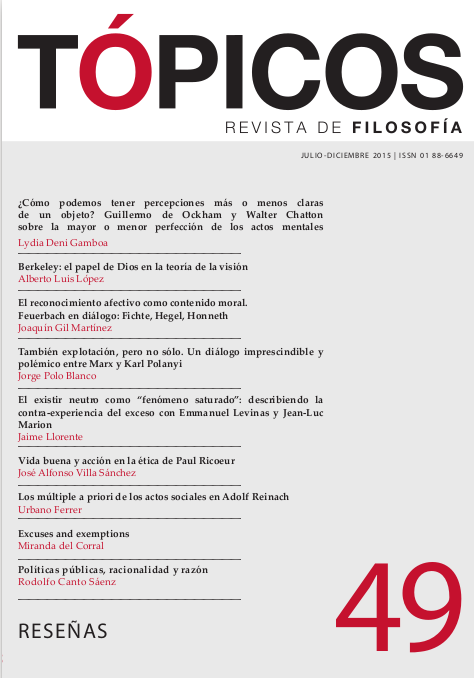Pubblicato 2015-07-31
Come citare
Downloads
Altmetrics
Citas
Abstract
Excuses and exempting conditions aim to mitigate responsibility. This paper proposes a distinction between excuses and exemptions in terms of the distinctive kind of judgement each of them aims to respond. I argue that exemptions affect the explanatory relevance of the accused, while excuses fully or partially justify her, by affecting the evaluative claim involved in responsibility attributions. This distinction supports the claim that attributing responsibility is a two-step process, each of them corresponding to a different kind of responsibility—agential and moral—whose attribution is guided by two different although related cognitive and argumentative tasks: explaining an outcome, and evaluating its moral significance.
Riferimenti bibliografici
- Alicke, M. D. (1992). Culpable Causation. Journal of Personality and Social Psychology, 63 (3), 368–378.
- Alvarez, M. (2009). How Many Kinds of Reasons? Philosophical Explorations, 12 (2), 181–193.
- Austin, J. L. (1956). A Plea for Excuses: The Presidential Address. In Proceedings of the Aristotelian Society, 57, 1–30.
- Bacon, F. (1630). The Elements of the Common Lawes of England. 2003rd ed. New Jersey: The Lawbook Exchange, Ltd.
- Baron, J. (2004). Normative Models of Judgment and Decision Making. In Blackwell Handbook of Judgment and Decision Making. D. J. Koehler, & N. Harvey (Eds.) (19–36). Malden MA: Blackwell.
- Baron, M. (2007). Excuses, Excuses. Criminal Law and Philosophy, 1 (1), 21–39.
- Beebee, H. (2004). Causing and Nothingness. In Causation and Counterfactuals. J. D. Collins, E. J. Hall & L. A. Paul (Eds.) (291–308). Mass: The MIT Press.
- Berman, M. N. (2003). Justification and Excuse, Law and Morality. Duke Law Journal, 53, 1–77.
- Björnsson, G., & Persson, K. (2012). The Explanatory Component of Moral Responsibility. Noûs, 46 (2), 326–354.
- Bok, H. (1998). Freedom and Responsibility. Princeton: Princeton University Press.
- Botterell, A. (2009). A Primer on the Distinction between Justification and Excuse. Philosophy Compass, 4 (1), 172–196.
- Braham, M. & van Hees. M. (2012). An Anatomy of Moral Responsibility. Mind, 121 (483), 601–634.
- Campbell, J. K. (2005). Compatibilist Alternatives. Canadian Journal of Philosophy, 35 (3), 387–406.
- Ditto, P. H., Pizarro, D. A. & Tannenbaum, D. (2009). Motivated Moral Reasoning. In Psychology of Learning and Motivation. B. H. Ross (Ed.) 50, (307–338). Burlington: Academic Press.
- Driver, J. (2008). Attributions of Causation and Moral Responsibility. In Moral Psychology. W. Sinnott-Armstrong (Ed.) 2, (423–440). Cambridge, Mass.: MIT Press.
- Duff, R. A. (2007). Excuses, Moral and Legal: A Comment on Marcia Baron’s ‘excuses, Excuses.’ Criminal Law and Philosophy, 1 (1), 49–55.
- Frankfurt, H. (1987). Identification and Wholeheartedness. In Responsibility, Character and the Emotions. F. Shoeman (Ed.) (27–45). New York: Cambridge University Press.
- Franklin, C. E. (2013). A Theory of the Normative Force of Pleas. Philosophical Studies, 1–24.
- Funkhouser, E. (2002). Three Varieties of Causal Overdetermination. Pacific Philosophical Quarterly, 83 (4), 335–351.
- Greene, J. & Cohen, J. (2004). For the Law, Neuroscience Changes Nothing and Everything. Philosophical Transactions of the Royal Society B: Biological Sciences, 359 (1451), 1775–1785.
- Hitchcock, C. R. (1996). The Role of Contrast in Causal and Explanatory Claims. Synthese, 107 (3), 395–419.
- Kauppinen, A. (2007). The Rise and Fall of Experimental Philosophy. Philosophical Explorations, 10 (2), 95–118.
- Keating, G. C. (1996). Reasonableness and Rationality in Negligence Theory. Stanford Law Review, 48, 311–384.
- Knobe, J. (2003). Intentional Action and Side Effects in Ordinary Language. Analysis, 63 (3), 190–194.
- Knobe, J., Buckwalter, W., Nichols, S., Robbins, P., Sarkissian, H. & Sommers, T. (2012). Experimental Philosophy. Annual Review of Psychology, 63, 81–99.
- Knobe, J. & B. Fraser. (2008). Causal judgment and moral judgment: Two experiments. Moral psychology, 2, 441–448.
- Knobe, J. & S. Nichols. (2013). An Experimental Philosophy Manifesto. In Experimental Philosophy. (3–14). Oxford, New York: Oxford University Press.
- Mellema, G. (1985). Shared Responsibility and Ethical Dilutionism. Australasian Journal of Philosophy, 63 (2), 177 187.
- Menzies, P. (2004). Difference-Making in Context. In Causation and Counterfactuals. J.D. Collins, N. Hall, & L. A Paul (Eds.) (139–180). Cambridge, Mass.: The MIT Press.
- Moore, M. S. (2009). Causation and Responsibility: An Essay in Law, Morals, and Metaphysics. Oxford: Oxford University Press.
- Moran, Richard. (2001). Authority and Estrangement: An Essay on Self-Knowledge. Princeton NJ: Princeton University Press.
- Pettit, P. (2007). Responsibility Incorporated. Ethics, 117, 171–201.
- Ross, A. (1975). On Guilt, Responsibility, and Punishment. Great Britain: Univ of California Press.
- Roxborough, C. & Cumby, J. (2009). Folk psychological concepts: Causation. Philosophical Psychology, 22 (2), 205–213.
- Sartorio, C. (2004). How To Be Responsible For Something Without Causing It. Philosophical Perspectives, 18 (1), 315–336.
- ____ (2007). Causation and Responsibility. Philosophy Compass, 2 (5), 749–765.
- Schweder, R. (1999). Causal Explanation and Explanatory Selection. Synthese, 120 (1), 115–124.
- Smith, A. M. (2007). On Being Responsible and Holding Responsible. The Journal of Ethics, 11 (4), 465–484.
- Strawson, P. F. (2008). Freedom and Resentment and Other Essays. New York: Taylor & Francis.
- Wallace, R. J. (1994). Responsibility and the Moral Sentiments. Cambridge Mass.: Harvard University Press.
- Watson, G. (1987). Responsibility and the Limits of Evil: Variations on a Strawsonian Theme. In Responsibility, Character and the Emotions. F. Shoeman (Ed.) (256–286). Cambridge: Cambridge University Press.
- Weiner, B. (1995). Judgments of Responsibility: A Foundation for a Theory of Social Conduct. New York: Guilford Press.
- Westen, P. (2006). An Attitudinal Theory of Excuse. Law and Philosophy, 25 (3), 289–375.






